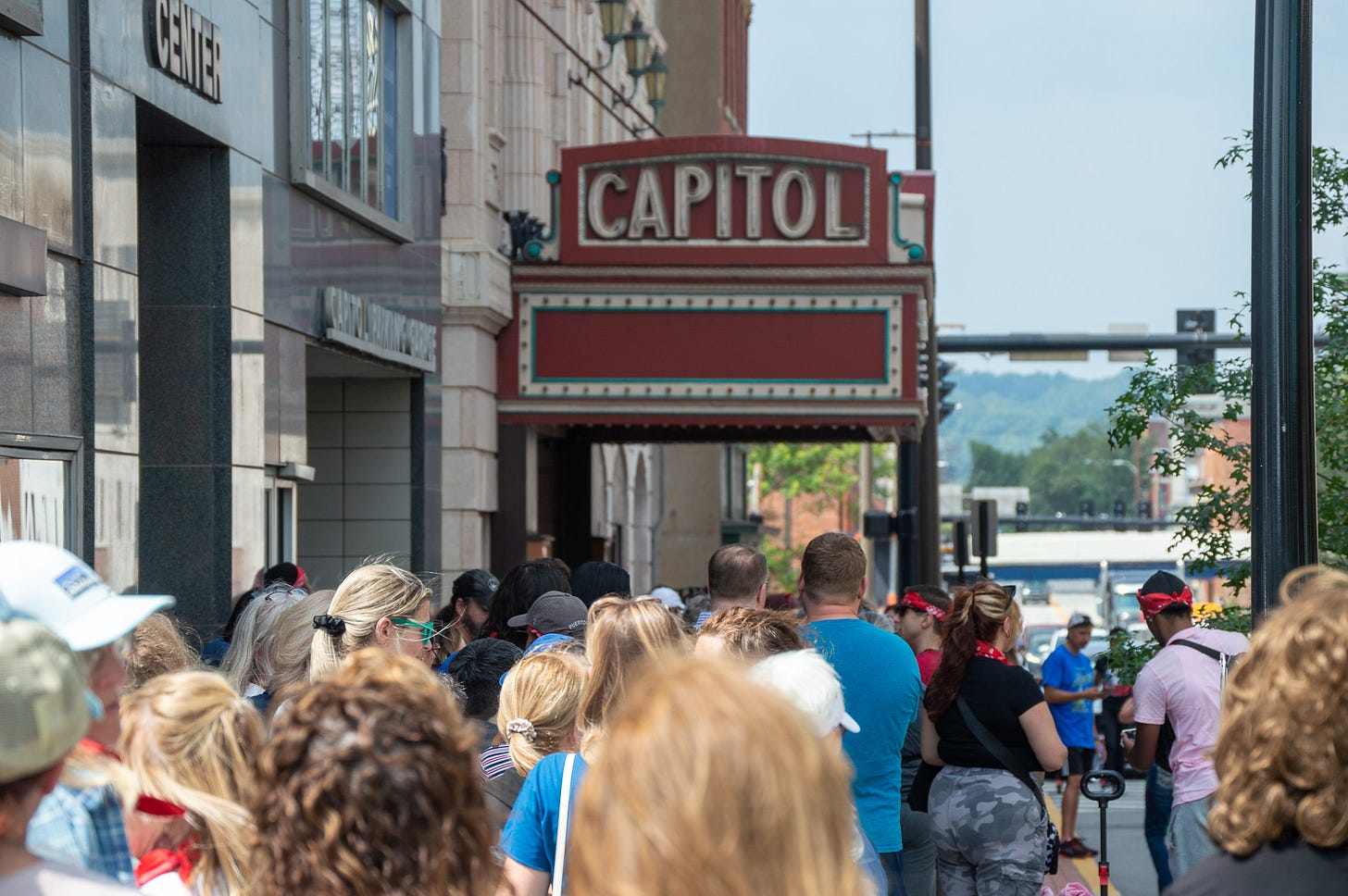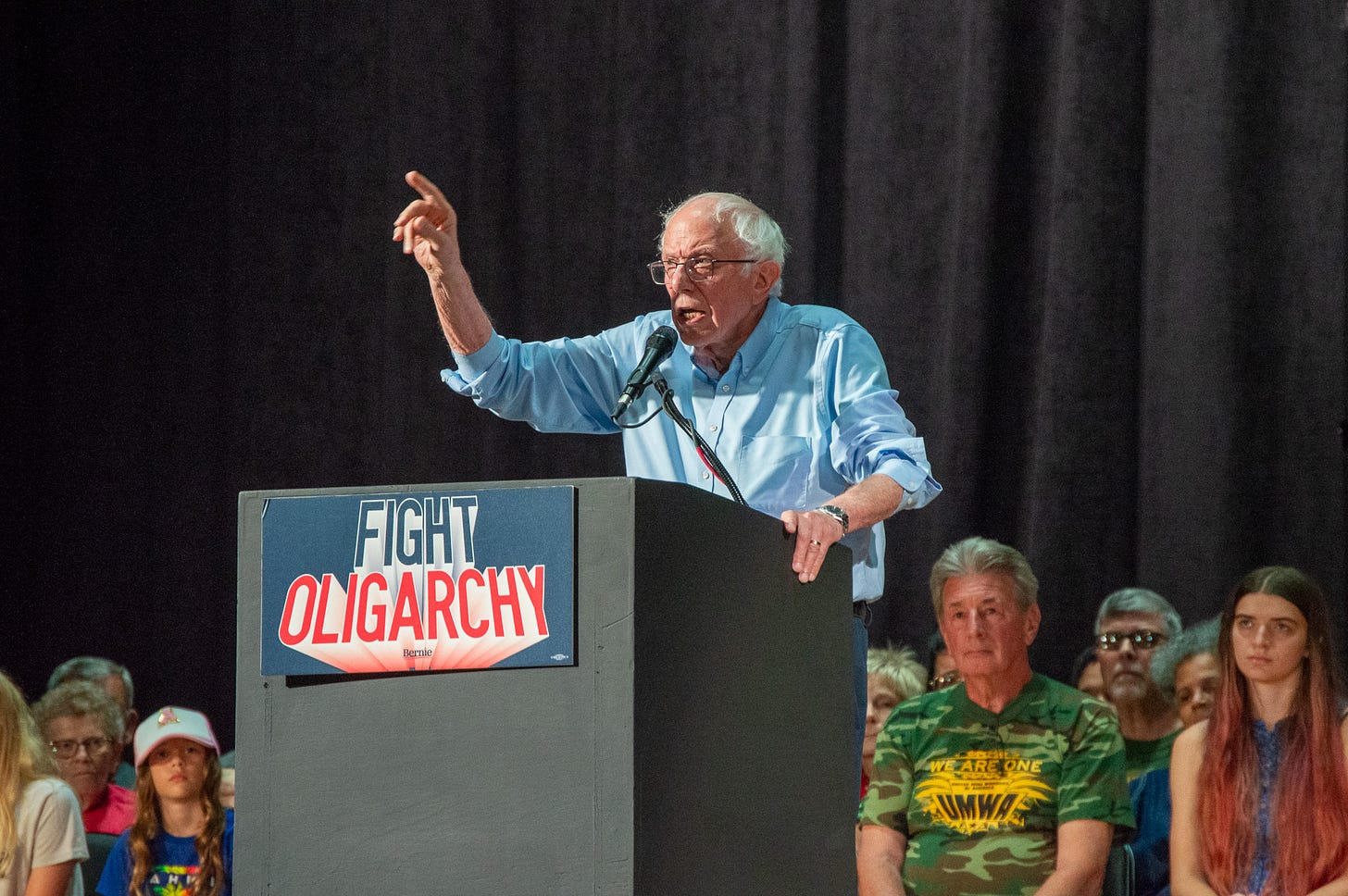Sen. Sanders packs Capitol Theatre for ‘Fighting Oligarchy’ tour
Speaking to a packed house in Wheeling during his ‘Fighting Oligarchy’ tour, Sen. Sanders and four regional activists shared their desires to see a more equitable, affordable, and accountable nation.
WHEELING – In “ruby red” West Virginia, thousands turned out to hear the progressive, self-avowed democratic socialist Senator Bernie Sanders during his latest round of his ‘Fighting Oligarchy’ tour. The 83-year-old independent had no problem filling the nearly 2,400 seats of Wheeling’s historic Capitol Theatre as he railed against what he says is a country whose policies and priorities are dictated by the ultra wealthy.

Sen. Sanders, a two-time Democratic candidate for President of the United States, has for years campaigned on social progressivism, raising the minimum wage, advocating for his single-payer ‘Medicare for All’ proposal, and expanding labor rights and protections. While his ideas have changed little since he rose to national prominence in 2015, excitement behind his visit to the Friendly City remained high.
Prior to his headlining event, several speakers from the region spoke of their work in the Mountain State and their desire to see their perceived problems addressed at a local, state and national level.
Morgantown Deputy Mayor Brian Butcher, former state Delegate Danielle Walker and Democratic candidate for the U.S. Senate Zach Shrewsbury touched on issues of rising housing cost, stagnating wages, a lack of funding for infrastructure and healthcare, and a bemoaning of corruption in, and the exploitation of, West Virginia.
Taking a more local approach, Amy Jo Hutchinson, an activist from Triadelphia, spoke of her community’s efforts to recover in the aftermath of devastating floods that destroyed dozens of homes and killed nine people on June 14, and the 38 days it took for the federal government to approve a federal disaster declaration for the area.
“Our community came and filled in the gaps like we always do here in West Virginia when hell and high water breaks loose,” Hutchinson said. “The longer [recovery] goes on, the more determined we become because it’s a very bitter pill to swallow to realize that the people representing you literally don’t give a damn if you live or die.”

With a crowd energized by the previous four speakers, Sen. Sanders took the stage to raucous cheers and applause. Known for his support for a single-payer healthcare system, the senator began his remarks by criticizing the Republican-controlled Congress for their adoption of a budget bill that could result in millions losing their health insurance.
“When you throw 15 million people off of their healthcare…you know what happens when people can’t go to a doctor when they need to,” Sanders asked. “They die. A study came out from Yale and the University of Pennsylvania estimating that up to 50,000 people a year will die unnecessarily because of Trump’s ‘Big Beautiful Bill.’”
Sen. Sanders went on to call out what he said was a “religion [of] greed” from the wealthy in the country, contrasting their experience with the 60% of Americans who live paycheck to paycheck.
“The bottom line is that in the richest country in the history of the world, millions of our people are struggling just to survive and are experiencing enormous stress,” Sanders said. “Now, what our job is is to profoundly take on the ideology of the corporate world and oligarchs.”
Wrapping up his remarks, Sen. Sanders called on West Virginians to resist the “old demagogic trick of trying to divide us” and fight for a new future. “Our job is to bring our people together around an agenda that works for all of us,” Sanders said. “So, West Virginia, this a working class state. Let’s start electing people who represent the working class, not the billionaires.”
Opinion: What Sanders’ tour means for West Virginia…
Before the senator came to Wheeling, many Republican elected officials mocked the stop saying Sanders would struggle to fill seats, that his policies are not supported by West Virginians, and that Sanders himself was part of the ‘oligarchy’ he proposed fighting.
After the event, Sanders-opponents then claimed attendees were bussed in from out-of-state to fluff numbers and that the crowd did not represent the people of West Virginia. This cycle repeated as the senator continued his West Virginia tour in Lenore and Charleston.
An unabashed, self-avowed ‘democratic socialist’ is an easy target for conservatives, especially one who himself has an estimated net worth of around $3 million. That’s more money that most West Virginians will ever see, but it’s a similar net worth to Sen. Shelley Moore Capito ($3.07 million), and pales in comparison to Rep. Carol Miller ($16.6 million) and Sen. Jim Justice ($1.1 billion), as reported by the Dominion Post.
Sen. Sanders’ ‘Fighting Oligarchy’ tour isn’t arguing that no American should have wealth, but that the wealthy should not hold as much power and influence as they do. Whether you agree with that or not, it’s an important distinction when considering the critique.
Another point to consider is that Sen. Sanders did what no member of the West Virginia Congressional delegation seems willing to do: talk directly to a public gathering of constituents. It’s hard to find any instance of a West Virginia representative holding a town hall, public forum, or rally in the state since the COVID-19 pandemic. And this year, with the start of the 119th Congress, has seen not one of these public events. Whether town halls are productive or not is a debate that can be had, but constituents want to hear from their leaders. So, when a member of Congress – especially one of high notoriety like Sen. Sanders – chooses to come to West Virginia, of course people will turn out to listen, whether they agree or not.
Whether the senator’s ‘Fighting Oligarchy’ stops in West Virginia will make any difference is unclear. At the end of the day, Sen. Sanders does align with a party that has been out of favor in the state for years now.
Still – and despite that fact – a welcomed change that could come from this moment is threefold: (1) more involvement in local and state politics, (2) more access to the people we elect to represent us, and (3) more conversations about the issues that all of us, no matter our political stride, face in an ever-expensive America.


Thanks for writing. You have provided some interesting numbers on the wealth of some of our representatives.